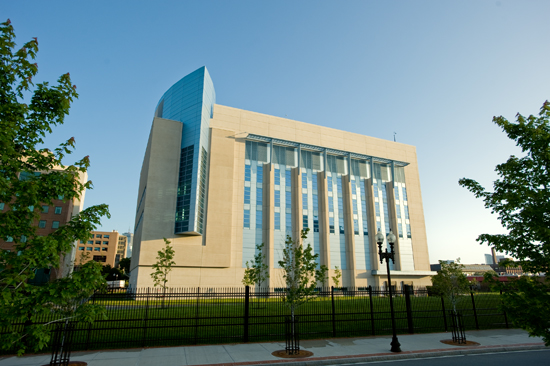NRC Finds Flaws in Draft of NEIDL Risks
Consultant urged to take new tack in safety study

The National Research Council has raised concerns in a letter posted on its website yesterday about the methodology used in an ongoing study of the risks associated with the National Emerging Infectious Diseases Laboratories (NEIDL) on the Boston University Medical Campus.
The NRC found that the risk assessment, which is being supervised by the National Institutes of Health and conducted by the consultancy Tetra Tech, had yet to respond to a recommendation for tiered quantitative and qualitative analyses and that its researchers erred when they used expert opinions as a substitute for absence of actual data on 13 pathogens in a modeling process. The NRC committee, whose concerns stem from a scheduled review of a preliminary draft of the risk assessment, urged Tetra Tech to make a “midcourse correction” and use actual data rather than the opinions of experts.
In response to the NRC letter, Boston University, which received $128 million from the NIH in 2003 to build the laboratories, issued a statement expressing disappointment that Tetra Tech’s preliminary report did not respond to the previous recommendations of the NRC. The University made it clear that the future of the project depended on the scientific soundness of the risk assessment.
“Although we firmly believe that the high-containment laboratory can be operated safely, we are also convinced that the additional scientific analysis to test our belief is vital to the project’s credibility and is something to which the community is entitled,” the statement says. “Unless the final report is thorough, complete, and scientifically sound, the permitting of the laboratory cannot proceed.”
The current analysis is the second effort to assess the risks of the project to have been requested by the federal and state courts in response to community opposition to the project. A 2007 study conducted voluntarily by the NIH, which found that the current location is as safe as, or safer than, suburban or rural alternatives, was deemed by the courts to be inadequate.
Art Jahnke can be reached at jahnke@bu.edu.
Comments & Discussion
Boston University moderates comments to facilitate an informed, substantive, civil conversation. Abusive, profane, self-promotional, misleading, incoherent or off-topic comments will be rejected. Moderators are staffed during regular business hours (EST) and can only accept comments written in English. Statistics or facts must include a citation or a link to the citation.